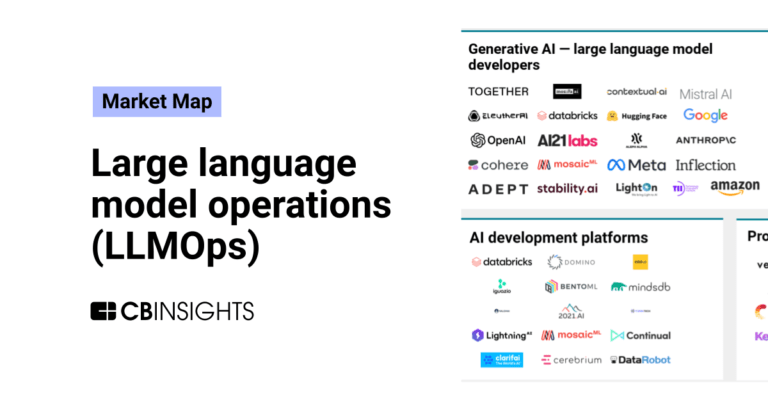
MindsDB
Founded Year
2017Stage
Series A - III | AliveTotal Raised
$52.2MRevenue
$0000Mosaic Score The Mosaic Score is an algorithm that measures the overall financial health and market potential of private companies.
+1 points in the past 30 days
About MindsDB
MindsDB is a data platform that focuses on artificial intelligence in the data sector. The company provides solutions for automating data processes that enable decision-making and integration of structured and unstructured data from various sources. MindsDB's products aim to answer data queries and provide insights while ensuring security. It was founded in 2017 and is based in San Jose, California.
Loading...
MindsDB's Product Videos
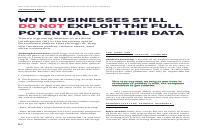
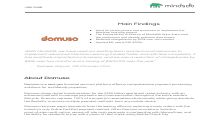
ESPs containing MindsDB
The ESP matrix leverages data and analyst insight to identify and rank leading companies in a given technology landscape.
The AI development platforms market offers solutions that serve as one-stop shops for enterprises that want to develop and launch in-house AI projects. Vendors in this space enable organizations to manage aspects of the AI lifecycle — from data preparation, training, and validation to model deployment and continuous monitoring — through a single platform to facilitate end-to-end model development.…
MindsDB named as Challenger among 15 other companies, including Scale, Weights & Biases, and Dataiku.
MindsDB's Products & Differentiators
Minds Enterprise
Connect, unify, and respond to any data, anywhere with human-level intelligence.
Loading...
Research containing MindsDB
Get data-driven expert analysis from the CB Insights Intelligence Unit.
CB Insights Intelligence Analysts have mentioned MindsDB in 4 CB Insights research briefs, most recently on Jun 20, 2024.
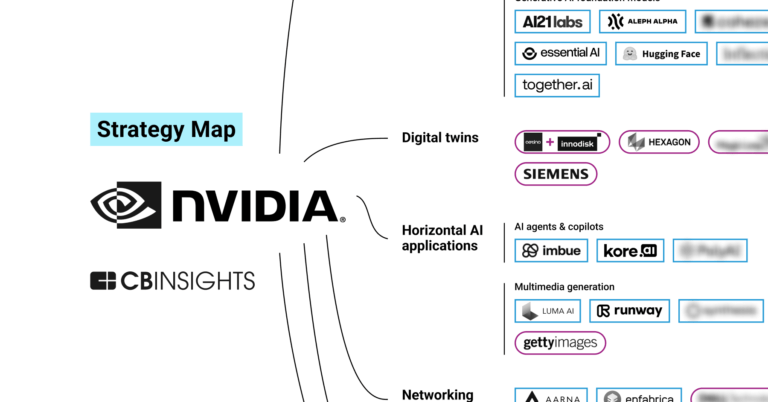
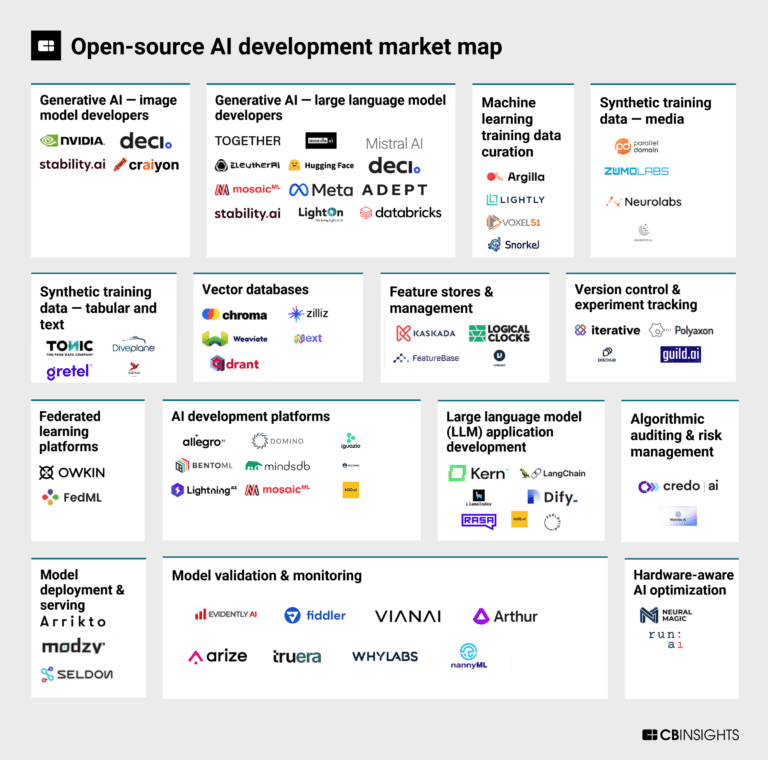
Oct 13, 2023
The open-source AI development market map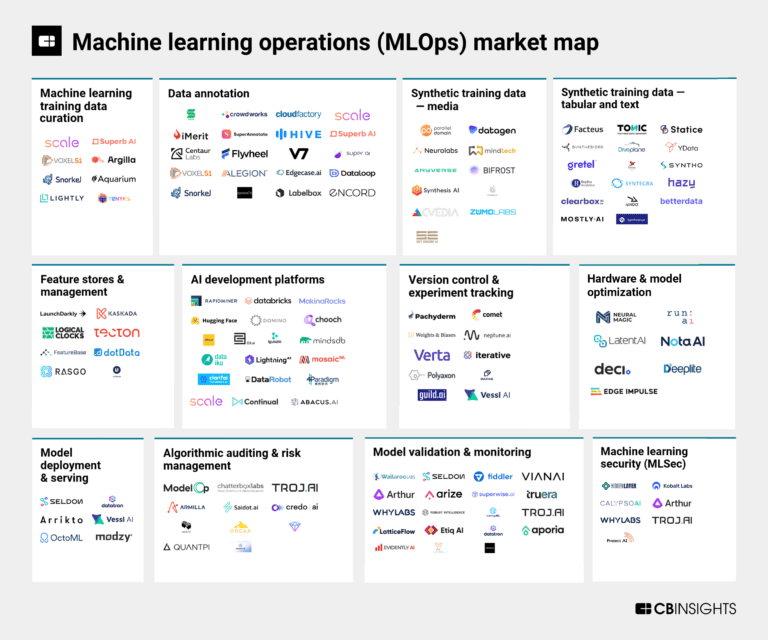
Sep 29, 2023
The machine learning operations (MLOps) market mapExpert Collections containing MindsDB
Expert Collections are analyst-curated lists that highlight the companies you need to know in the most important technology spaces.
MindsDB is included in 6 Expert Collections, including Hydrogen Energy Tech.
Hydrogen Energy Tech
3,196 items
Companies that are engaged in the production, utilization, or storage and distribution of hydrogen energy. This includes, but is not limited to, companies that manufacture hydrogen, those that convert hydrogen into usable energy, and those that store and distribute hydrogen.
AI 100 (All Winners 2018-2025)
200 items
Generative AI 50
50 items
CB Insights' list of the 50 most promising private generative AI companies across the globe.
Generative AI
2,793 items
Companies working on generative AI applications and infrastructure.
AI 100 (2024)
100 items
Artificial Intelligence
10,195 items
Latest MindsDB News
Aug 15, 2025
Even as dashboards and query tools become easier to use, asking for skills in querying languages (i.e., minus the layman-friendly interfaces), most people can't do it. Natural language interfaces based on LLMs provide promise, but most Text-to-SQL tools do not satisfy the requirements for enterprise-level operations. Analysts from leading firms have highlighted this “unused data crisis,” noting that well over half of enterprise data is never leveraged for analytics or decision-making. For example, an IDC survey of global companies (commissioned by Seagate) found only 32% of available data is put to work—meaning 68% remains untapped. Why Text-To-SQL Is More Important Than You Think Text-to-SQL is one of the most useful and direct LLM applications in the industry. It links the chasm between decision-makers and databases, translating English into code and minimizing data team dependencies. But adoption has been slow—not because the concept is flawed, but because most systems were not designed for the data challenges we face now. The Reality: Most Tools Come Up Short • Single-Database Specificity: Most agents are bound to a single RDBMS (PostgreSQL or SQLite, for instance). At scale, even large organizations have to deal with dozens of databases, each using its own special schema. According to AWS , enterprise topology typically involves 100 or more tables, and dynamic schema discovery combined with strong error handling is a must. • Schema Blindness: LLMs from schema context to schema-less context can either hallucinate or output wrong SQL. K2View highlights the issues: "LLMs need to be aware of relevant database schema ... it's challenging for databases with hundreds or thousands of tables." • Security And Stability Vulnerabilities: LLM agents, which are stateless, can be used for formulating unsafe or invalid queries. Risks to accuracy and compliance. Those risks can multiply when the messages are sent without both validation and retry logic. Both AWS and K2View stress the need for query auditing and results tracking. • Latency And Cost Without Caching: Repeatedly invoking an LLM to produce the same SQL query can be costly and slow. To work efficiently at an enterprise scale , you need memory, you need caching and you need an offline mode. • Schema Awareness In The Real World: In the wild, ask any engineer on Reddit's /r/LangChain about their experiences and gripes with understanding a schema, interpreting column names loosely or joining tables to make it to the lights. The Rise Of Open-Source Innovation Thankfully, this problem has a response from the open source world. There are not many tools that offer a complete solution, but a few are addressing important chunks of the problem: DB-GPT is designed to enable conversational queries over multi-table relational databases with minimal metadata awareness, targeting a structured backend. LlamaIndex connects structured and unstructured data for hybrid retrieval in the context of metadata graphs. MindsDB connects LLMs with SQL and ML workflows from over 30 data sources, focusing on ease of use. TextQL, a YC-backed company, translates programs over business hypotheses to SQL queries for experiments. mcp_ohmy_sql is an open-source Text-to-SQL system developed for deployment in enterprise production. It is not about specific features as much as about integration, scale and reliability: It supports multiple SQL-compatible backends, including Redshift, with Snowflake, OpenSearch and MongoDB (coming soon). It supports local Parquet cache and contains an embedded DuckDB engine for offline queries. It has SQL memory, so it's not generating the same again and again and ensures consistency. It allows resolving user intents to schema-aligned queries by incorporating a business term dictionary (MCP). The endgame isn't just generating SQL; it's generating SQL that is usable, auditable and deployable at scale. Conclusion: From Possibility To Practice The true potential for Text-to-SQL is not mere technical feasibility but rather in the ability to develop robust, contextually-aware and scalable systems that free enterprise users to genuinely democratize access to their data. There are tools like mcp_ohmy_sql that do this for us: It is the link between natural language and structured data, which operationalizes the promise of AI-driven analytics. Here's the prevailing argument: In order to succeed, these sorts of problems need infrastructure-level solutions that are deeply integrated with real business problems. As organizations invest in generative AI, sustained value will come from tools that can convert more than just language to SQL but do so with an understanding of business rules, governance and real-world schemas. The winning solutions will go way beyond shimmering demos; they will be trusted, industrial-grade platforms that extract enterprise data and turn it into a universally accessible resource—realizing the essential promise behind this technological shift. Forbes Technology Council is an invitation-only community for world-class CIOs, CTOs and technology executives. Do I qualify?
MindsDB Frequently Asked Questions (FAQ)
When was MindsDB founded?
MindsDB was founded in 2017.
Where is MindsDB's headquarters?
MindsDB's headquarters is located at 3277 South White Road, San Jose.
What is MindsDB's latest funding round?
MindsDB's latest funding round is Series A - III.
How much did MindsDB raise?
MindsDB raised a total of $52.2M.
Who are the investors of MindsDB?
Investors of MindsDB include Open Ocean Capital, Benchmark, Mayfield, Y Combinator, Walden Catalyst Ventures and 11 more.
Who are MindsDB's competitors?
Competitors of MindsDB include Databricks, Glean, Chalk, Flexor, Fireworks AI and 7 more.
What products does MindsDB offer?
MindsDB's products include Minds Enterprise and 1 more.
Who are MindsDB's customers?
Customers of MindsDB include Sema4.
Loading...
Compare MindsDB to Competitors

Domino provides an enterprise artificial intelligence platform for AI model development and deployment across various industries. The company's offerings include a platform for building, deploying, and managing AI models, with features that support collaboration and integration into enterprise workflows. Its platform is intended to support AI operations and knowledge sharing within organizations. The company was founded in 2013 and is based in San Francisco, California.

Dataiku is an artificial-intelligence (AI) platform that integrates technology, teams, and operations to assist companies in incorporating intelligence into their daily operations across various industries. The platform provides tools for building, deploying, and managing data, analytics, and AI projects, including Generative AI, Machine Learning, data preparation, insights generation, and AI governance. Dataiku serves banking, life sciences, manufacturing, telecommunications, insurance, retail, public sector, utilities, energy, and healthcare sectors. It was founded in 2013 and is based in New York, New York.

DataRobot provides artificial intelligence (AI) applications and platforms within the enterprise AI suite and agentic AI platform domains. Its offerings include a suite of AI tools that integrate into business processes, allowing teams to manage AI, along with AI governance, observability, and foundational tools. DataRobot serves sectors including finance, supply chain, energy, financial services, government, healthcare, and manufacturing. It was founded in 2012 and is based in Boston, Massachusetts.

H2O.ai specializes in generative AI and machine learning. It provides a comprehensive AI cloud platform for various industries. The company offers a suite of AI cloud products, including automated machine learning, distributed machine learning, and tools for AI-driven data extraction and processing. H2O.ai caters to sectors such as financial services, healthcare, insurance, manufacturing, marketing, retail, and telecommunications. H2O.ai was formerly known as 0xdata. It was founded in 2012 and is based in Mountain View, California.

Mindtech specializes in synthetic AI training data and the development of AI-based vision systems within the technology sector. The company offers a Chameleon Platform that provides a behavioral simulator for creating and curating datasets, which integrates synthetic with real-world data to enhance the training of AI systems. Mindtech serves various sectors, including automotive, transport, logistics, manufacturing, retail, e-commerce, safety, security, and smart city domains. It was founded in 2017 and is based in Sheffield, United Kingdom.

GAI Insights focuses on providing generative artificial intelligence (AI) solutions within the AI sector. The company offers a range of services including industry-specific research, benchmarking, employee training, and advisory services for implementing large language models in enterprises. It serves the needs of corporate buyers and AI leaders looking to leverage AI for business transformation. It was founded in 2023 and is based in Boston, Massachusetts.
Loading...

